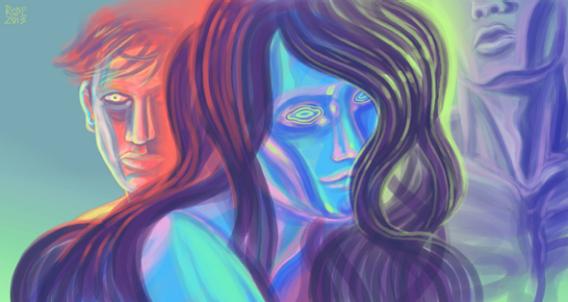
Illustration by Dalton Rose
There is a moment in Pamela Erens? second novel, The Virgins, in which two boarding school kids look out onto a private field in winter. The snow all around the field is ?thickly cratered with footprints that cross this way and that and fall into each other,? but the snow on the field itself is unsullied. It is 1979, in that giddy sliver of exploration after the sexual revolution and before the rise of AIDS. The girl is 16. She turns, closes her eyes and falls backward into the field. The boy is there to catch her.
The Virgins is, before anything else, a tragedy. The reality of losing your virginity cannot compare to all the metaphors. If you find yourself in an exquisitely lovely, untouched field with your beloved, you should probably run away.? ?
At least that seems to be the jaded perspective of Erens? narrator-villain, Bruce Bennett-Jones, a third-generation Auburn graduate half-recalling and half-imagining the high school romance between two of his classmates, Aviva Rossner and Seung Jung. Bruce cops to ?sourness? as his defining trait, though there are so many more to choose from: prurience, jealousy, cruelty, loneliness, self-loathing, self-pity. He?s a storyteller, a lover of ancient tragedies and Greek myths. Early on, he tries to rape Aviva in an abandoned boathouse. It is after she shuts him down that he retreats into voyeurism and fantasy, though his obsession never wavers. He speaks from some time in his adult future, in tones of alternating lasciviousness and regret. ?I ? see my tale as a kind of restitution,? he says. Often, it feels more like an attempt to repossess the girl who got away.
The virgins themselves are tender, flawed, and very likeable. Aviva, a tightly wound Jewish girl from an unhappy family, meets Seung, the laid-back son of Korean immigrants, in music theory class. (Or so Bennett-Jones relates; it?s clear from the beginning he?s an unreliable narrator.) Their liaison is highly visible on a Northeastern campus in the 1970s, though few of their classmates know that their dalliances??hours of leisurely pleasure??always stop short of sex.
To read The Virgins is to be reminded of the way that, to young people in a certain state of mind, any small threshold in life can be eroticized: diving into a pool, inhaling from a joint, unwrapping a gift. What comes next? Pleasure, sometimes, or a loss of self, or a faltering sadness: ?Afterward, the bright wrapping paper lies on the carpet in long, torn strips and crumpled balls. Yards of ribbon, immaculate bows, the hand-cut kind, like huge hydrangeas, that will go straight into the garbage in the morning.? We mythologize sex until it happens and then we long for the pretty innocence it replaces. Dispelling one mystery only remystifies the way we were.
Which was?how exactly? An act of both memory and invention, Bruce?s story unfolds in pieces, in long and short chapters, as if to underscore the brokenness or irrecoverability of that state. But he can sort of remember/recreate shards and glimmers: ?For none of us was it really about asses and crotches, sucking cock or licking pussy,? he says. ?We beginners experienced sex as psyche more than body, as vulnerability and power, exposure and flight, being consumed, saved, transfigured. To fail at it?to do it wrong?was to experience ? the death of one?s ideal soul.?
London 2012 Slalom Canoe Alex Morgan Misty May Treanor Marvin Hamlisch Megan Rossee grenada grenada
No comments:
Post a Comment
Note: Only a member of this blog may post a comment.